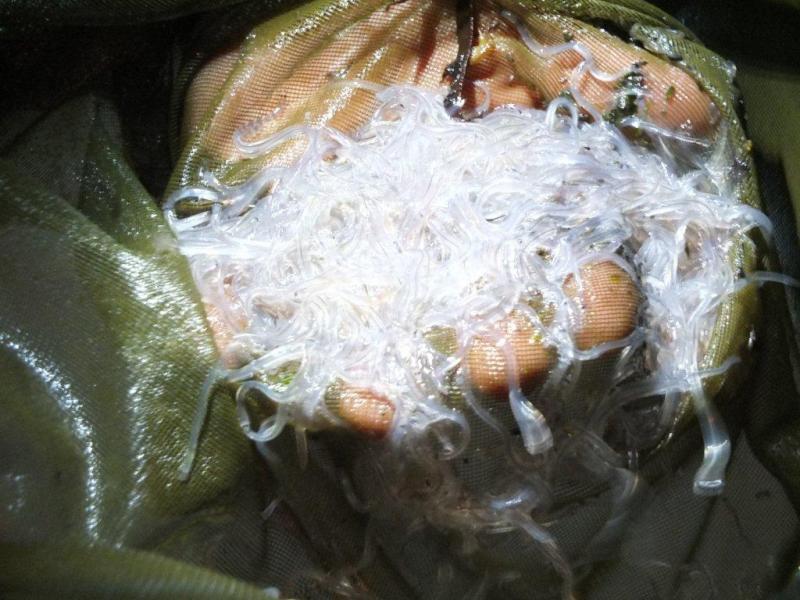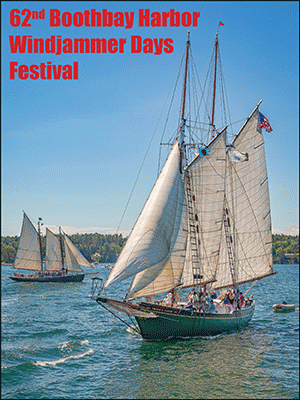'As good as gold'

Since the elver season started March 22, there have been a series of arrests made around the Boothbay Region.
Jerry Pike of Boothbay was arrested March 31 for fishing for elver within 150 feet of a fishway. On the same night, Lawrence Durfee of Boothbay Harbor was issued a citation for fishing for elver without a license in Edgecomb.
From March 31 through April 2 there were six separate incidents involving illegal elver fishing in and around the Boothbay region.
“The potential for a big paycheck is quite alluring for somebody who is inclined to cheat,” said Michael Forgues, a marine patrol officer who works for the Maine Department of Marine Resources.
Forgues’ job is to enforce the laws and ensure that legal fishing practices take place safely, while keeping a watchful eye out for violators. “When you’re selling something for $1,600 a pound, people take chances,” Forgues said.
Forgues patrols during the night shifts, where elver fishing occurs near freshwater rivers, brooks and streams that flow into the ocean. He said a lot hours can be spent staking out areas known to attract potential violators.
“Sometimes it’s easy to catch a violator that doesn’t put a lot of thought into what he is doing,” Forgues said. “Other times there are violators who put a great deal of thought into circumventing the law, and those are the people we’re really trying to catch.”
Illegal possession of elvers in Maine is now classified as a civil crime with a fine of up to $2,000. However, having passed the Maine House and Senate with an emergency provision, LD 632 will criminalize all elver fishery violations, according to a press statement from Jeff Nichols, the Director of Communication for the MDMR.
Rose Rizza and her husband Dan have been legally fishing elver in Boothbay Harbor for the past eight years. She said she thinks a mandatory $2,000 fine isn’t enough money to deter illegal fishing.
“I’d do it if I didn’t have a license,” Rose Rizza said. “For two grand? That’s better odds than a scratch ticket.”
Four times a week, the Rizzas drive two hours from Newport to Boothbay Harbor to fish their familiar spot in Mill Cove in the middle of the night. The high tide at night determines their schedule.
The husband and wife fish with funnel shaped dip nets, a method considered more challenging than the traditional fyke net, (a webbed barrier strung partially across a waterway).
By 2:15 a.m., April 16, the couple estimated they had caught 1.25 pounds. Although they would be making a little over $2,000 that night, they said they considered themselves a small-time operation.
“For seven years we did it; it was a couple hundred bucks here, a couple hundred bucks there, but we still did it,” Dan Rizza said. “Nowadays it’s as good as gold.”
Elvers, commonly called glass eels, have been commercially harvested in Maine since the mid-1970s. In the past years the market price for elver has skyrocketed to as high as $2,600 per pound due to shortages in far eastern countries where eels are considered high value. Many elver fishermen speculate that the demand remains high since the tsunami in 2011 destroyed many of the fisheries and farms in Japan where eel were harvested.
The Rizzas stood on the rocky shore next to their lanterns, which cast a warm glow on the rippling waves. They swirled their nets in a repetitive circle, brushing up against the sides of rocks, where the elver are said to swim.
“You can’t see them, but sometimes you see their shadows. They stay close to the cracks,” Dan Rizza said. Mill Cove has been a nice spot for them, but they don’t intend to make it big, he said.
Making it big is what Dan Rizza refers to as having a license to use both dip nets and fyke nets. Deploying both methods ensures the highest catch of elver as the eels ride the currents of the ebbing tide.
It’s not unusual for serious elver fishermen to gross a six-digit income, in some cases, millions if they know what they’re doing, Dan Rizza said.
While many legitimate elver fishermen make a living off a brief but lucrative two-month season, others try their luck evading game wardens and marine patrol.
“Not many people get away with it. The wardens are all over it,” Rose Rizza said.
Maine uses a lottery system to issue licenses. In 2006, legislation passed that eliminated new entries into the lottery. In 2013 the state issued only four new licenses on February 11, but then issued an additional 40 more licenses due to legislature that expanded the program.
There are now 655 valid Maine elver licenses this season. The current going rate is $1,800 per pound.
The Rizzas, who prefer the coziness of Mill Cove, said they started fishing elver when the price was $50 a pound. Although the rates are much higher now, they said they fish mostly because they enjoy being outside.
“It’s a vacation to me,” Rose Rizza said. “I always wanted to be a fisherwoman.”
Related:


































.png)


.png)
